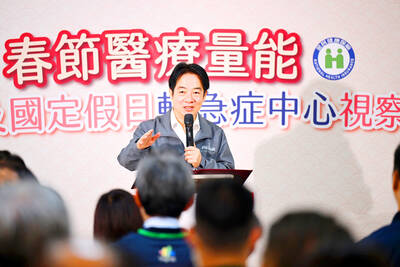The Tainan City Government has decided to persuade Falun Gong protesters to leave a historic site where they have maintained a constant presence to highlight their cause.
City government officials yesterday said the decision was reached after a meeting on Monday. If their efforts to communicate with the protesters fail, they will consider further steps, the officials said.
The city was particularly concerned about the possibility of a repeat of an incident on June 21 as the city gears up to welcome the expected influx of Chinese tourists next month.
On that day, a delegation of Chinese travel representatives visited the historic Fort Provincia in Tainan City. The fort was built in 1653.
Fearing that Chinese visitors would clash with the Falun Gong protesters gathered at the fort, the city government reportedly moved the protesters to another spot before arranging for the representatives to enter the fort via a side door.
In view of the city government’s handling of the Falun Gong devotees, some Democratic Progressive Party (DPP) city councilors yesterday expressed concern about the matter, calling on the city government not to remove or use any forceful action against the group.
Tainan Mayor Hsu Tain-tsair (許添財) has previously stated his support for freedom of speech. The city government’s cultural and tourism bureau yesterday said that the city government has long respected the religious thought and freedom of Falun Gong and would not use force against the group.
According to city officials, Falun Gong devotees have gathered in front of the fort for a long time, which officials believe has put tremendous pressure on the city’s tourism.
Bureau chief Hsu Keng-hsiu (許耿修) said that Falun Gong devotees have long maintained a presence in front of Fort Provincia and on the sidewalk of the 300-year-old Sacrificial Martial Temple nearby.
They also post signs, which he said violate traffic regulations restricting the posting of advertisements.
The city government will first “try to persuade them to leave,” and will “refrain from forcing them to disperse for the time being,” he said.
As for the protesters at Anping Fort, a fort in suburban Tainan built by the Dutch in 1624, Hsu said they have rented a pavilion in front of the fort, and are not breaking the law or city regulations.
The city government will not “take any action there.”
China in 1999 outlawed Falun Gong, a spiritual practice invented by Li Hongzhi (李洪志). Li has said that Falun Gong is simply a popular qigong activity that does not have any particular organization, let alone any political objectives.
Falun Gong protesters have since gained the spotlight in many countries protesting against what they say is Beijing’s practice of torturing the movement’s practitioners.

PEACE AT LAST? UN experts had warned of threats and attacks ahead of the voting, but after a turbulent period, Bangladesh has seemingly reacted to the result with calm The Bangladesh Nationalist Party (BNP) yesterday celebrated a landslide victory in the first elections held since a deadly 2024 uprising, with party leader Tarique Rahman to become prime minister. Bangladesh Election Commission figures showed that the BNP alliance had won 212 seats, compared with 77 for the Islamist-led Jamaat-e-Islami alliance. The US embassy congratulated Rahman and the BNP for a “historic victory,” while India praised Rahman’s “decisive win” in a significant step after recent rocky relations with Bangladesh. China and Pakistan, which grew closer to Bangladesh since the uprising and the souring of ties with India, where ousted Bangladeshi prime minister Sheikh Hasina

FAST-TRACK: The deal is to be sent to the legislature, but time is of the essence, as Trump had raised tariffs on Seoul when it failed to quickly ratify a similar pact Taiwan and the US on Thursday signed a trade agreement that caps US tariffs on Taiwanese goods at 15 percent and provides preferential market access for US industrial and agricultural exports, including cars, and beef and pork products. The Taiwan-US Agreement on Reciprocal Trade confirms a 15 percent US tariff for Taiwanese goods, and grants Taiwanese semiconductors and related products the most-favorable-treatment under Section 232 of the Trade Expansion Act, the Executive Yuan said. In addition, 2,072 items — representing nearly 20 percent of Taiwan’s total exports to the US — would be exempt from additional tariffs and be subject only to

NON-NEGOTIABLE: The US president’s action ran counter to one of the US’ ‘six assurances’ on not consulting China about arms sales to Taiwan, US lawmakers said US President Donald Trump’s admission that he is discussing arms sales to Taiwan with Chinese President Xi Jinping (習近平) is “alarming and a blatant violation of US policy and the six assurances,” US Representative Ro Khanna said on Tuesday. Trump on Monday said he would decide soon on whether to send more weapons to Taiwan, after Xi warned him not to do so. “I’m talking to him about it. We had a good conversation, and we’ll make a determination pretty soon,” Trump told reporters aboard Air Force One when asked about warnings raised by Beijing during a phone call with Xi over

REAL EMERGENCIES: To avoid overcrowding, the health minister urged people with mild or moderate symptoms to go to UCCs, while the ER should be for critical cases President William Lai (賴清德) yesterday inspected the nation’s Lunar New Year medical preparedness with a visit to an urgent care center (UCC) in Taipei and expressed confidence in the Ministry of Health and Welfare’s plans to prevent emergency room (ER) overcrowding during the nine-day holiday. The ministry in November last year launched a pilot UCC program to provide urgent medical care at 13 clinics in the nation’s six special municipalities over weekends and on holidays, aimed at relieving pressure on crowded ERs. To ease ER overcrowding during the Lunar New Year, when most hospitals and primary care clinics are closed, the National